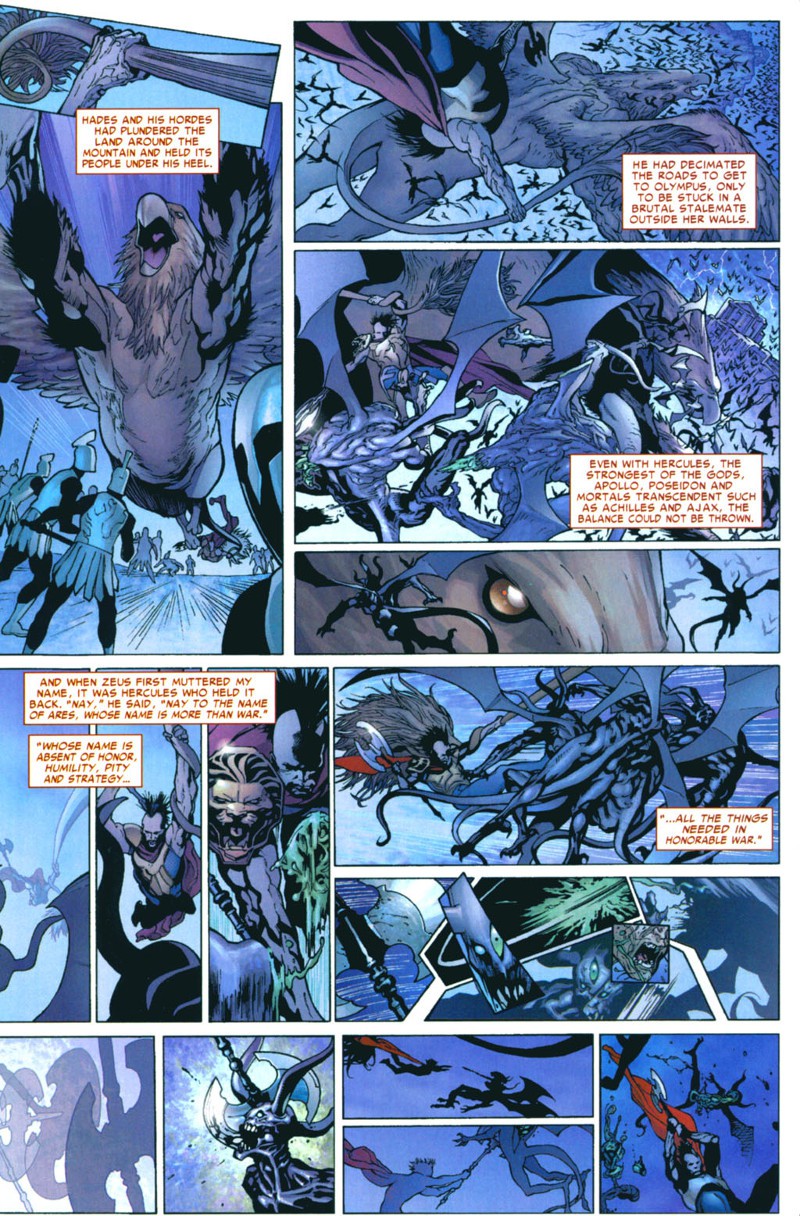Writer: Mike Oeming
Artists: Travel Foreman, Derek Fridolfs
Marvel Comics, 2006

LOVE IMPELS ME TO DESTROY you and all your ways. So states war. The purpose of war in the five-issue ARES story written by Mike Oeming, from 2006, is not about hatred, rather about securing one’s heritage, father to son, motivated by love, though indeed, hatred of father Zeus by prodigal son Ares brings him to slug the high father across the divine Olympian gathering chamber. A clenched-teeth hatred for his mother Hera surpasses even this. Yet despite their history of bad experiences, they all must unite to face a common foe as kin groups commonly do when confronted by an external threat.
I just filled in the last issues, and reread the entire play featuring Ares. Debating when and how violence may be necessary to save ourselves as a “we” kin group is a persistent question as we find peace marches don’t lead anywhere, only make us feel hip, while those in power are not likely to be talked out of it, like, “Oh sure, let me clean out my desk.” Just administration of force to expel bad elements follows the law and gives a sense of approbation for a right cause. This is how Hercules wants to fight, and he has been failing.
Zeus decides to call in Ares, who has no scruples. Once committed to the union, Ares lights aflame, and commands Hercules, “Throw me as far as you can into their ranks!!” Thus opens his charge upon the enemy.
“And so the poem of war goes on and on through generations and time,” the text tells us after five years have passed, at last approaching the high walls of the shadow lords in the East. The poem of American wars has gone on and on, likewise, through all the peace times and every president from the beginning, leaving enormous numbers of peoples eliminated, terrorized, deprived, and marginalized to serve free enterprise, from slavery to industry, and modern forms of servitude, partnering with the American state to ravage whole countries at a time to dominate property and commerce.
This is the bloody backdrop pulsing behind the liberal tradition of individual rights and money the past centuries, and particularly since 1950 when US hegemony began to rule the world without scruple. To this very day, this is the grim reality behind your happy family home in the suburbs, yet the killing has never been enough to motivate many of us at a time to call for peace, or to start a war to demand peace.
In the story here, deceptions, indoctrinations, councils, and courage play their familiar parts in war, though Ares himself remains straightforward, aiming to regain his kidnapped son, and preserve his arms to do it. Two illuminating elements rose to the surface in the drama: first when threads of an alliance between western and eastern godly pantheons began to weave together, so allies could help determine the outcome in the final battle; this told me to try to get help for the violent parts.

In the full range of actions required to achieve victory and salvation, I can help, but for sure it’s not going to be me on fire thrown into the surging enemy.
Second, when the Greek host of gods led by Hercules, and heroes led by Achilles, assembled for the final assault on the shadow lords, all seething with battle oaths, and Ares shouting for his son, “Alexander!” I saw our own sons and daughters on the other side of the wall, a beloved generation lost to us, because the future is lost, and it occurred to me this grim proposal is ever more a grim reality that must enforce our attention eventually.
At some moment we will turn over, one and the other, like Ares, and realize action is urgent, to demand: Get out of my way, I have a family to save. When that moment arrives, we will need some better ideas about who “we” are as a heritage, a global population and habitat, before we call Ares home.

